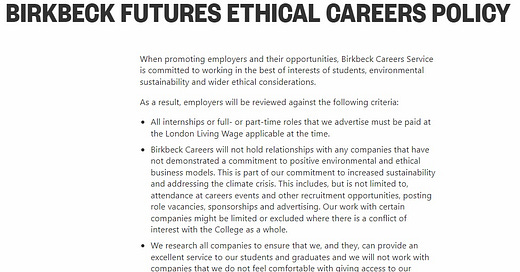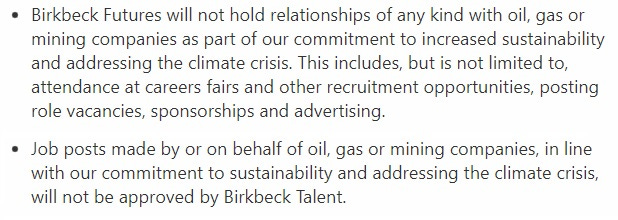(Part three)(The finale) Birkbeck university banning fossil fuel companies from recruiting students
The flip-flopping OIA comes to Birkbeck's rescue
Recap:
In 2022, I filed an official complaint against my university (Birkbeck) for its new “ethical careers policy”, after it came to my attention in an article in The Guardian: https://www.theguardian.com/environment/2022/sep/28/fossil-fuel-recruiters-banned-from-birkbeck-university-of-london-careers-service
To my horror, Birkbeck’s “ethical careers policy” (2022) read as follows:
As a BSc Geology student with aspirations for working in mining, this policy was totally unacceptable to me (and several fellow geology students). The policy is a clear instance of regulatory capture, which ideologically discriminates against students who wish to work in mining.
Birkbeck proceeded to violate its own complaint procedures, which demanded a response within ten days, by instead taking three months. This was very clearly done in order to give themselves enough time to officially enact the “ethical careers policy” without any formal challenge to it (by yours truly).
Ultimately, I escalated my complaint to the Office of the Independent Adjudicator (OIA), the “designated operator of the student complaints scheme under the Higher Education Act 2004.”
The OIA flip-flop:
At first, I was wildly successful with the OIA:
- I was awarded £250 compensation for the university’s failure to address my complaint within ten days.
- The university was strongly criticised for its failure to promptly address my complaint.
- My complaint was deemed “justified” by OIA, effectively overruling the university’s rejection of my complaint.
In its findings, the OIA recognised that my complaint was specifically about university policy, not the provision of specific services, and that (most importantly) the ethical careers policy had the “potential” to impact me (negatively) as a student, and so was therefore a justified complaint:
It seemed to me that the OIA was doing the right thing in opposing potential harm to students, as a result of university policy. I took it as clear advocacy of the precautionary principle.
The university granted me the £250 in compensation, but then proceeded to reject the OIA’s findings, arguing that:
1. No detriment to my career has been identified.
2. The policy aligns with guidance on “sustainability”.
3. The policy doesn’t reflect a view aligning with any political party.
4. The university doesn’t promote any political party.
5. The university doesn’t suppress political views.
Given the OIA’s past ruling on my complaint being justified for the mere “potential impact” to me, I felt like I was in a very strong position to challenge Birkbeck’s (Stage 3) rejection letter, and so I engaged in a rather savage critique, which I now paste here in full (my apologies for its length & the redactions are only for the case number):
Unfortunately, this is the part where we get to the OIA’s disgraceful flip-flop.
The OIA responded by totally reneging on its prior concerns about the policy’s “potential impact” (to me), by switching to Birkbeck’s side, arguing that only “direct impact” matters, and that since none existed, therefore my complaint was unjustified. This was a total contradiction of the OIA’s prior stance, but here’s their rationalisation, for the record, on why they think it wasn’t a contradiction:
Note how the OIA rationalised the contradiction. They argued that it wasn’t a contradiction because they “would usually expect a complaint” (by a student) … “ to be about something that has a direct impact upon them”.
Well, perhaps this case was one of the exceptions to the “usual” - Did they even consider that? Apparently not. What was once “usual” now became an absolute, never to be questioned.
Also, without supporting evidence, note how the OIA swished their hand and declared that I hadn’t been impacted or disadvantaged, because they “did not believe” (i.e. a faith-based, evidence-less opinion) that I had been negatively impacted. The justifiability of my case was now dependent on the beliefs of the OIA reviewer.
The precautionary principle was thrown out the window. It simply no longer mattered to the OIA whether students were at risk of potential harm from specific university policies. All that mattered now was whether students had already been harmed and could prove it. If there was a university building at risk of burning down and killing all the students inside, the OIA has effectively declared that it won’t hold the university accountable until the building had already burned down and killed all the students inside, because the OIA would usually expect a complaint to be about something that has a direct impact upon them.
Furthermore, the OIA also backed-up the university following my criticism of its political advocacy of “sustainability and addressing the climate crisis”, by arguing the following:
You see? It’s just a practice/policy relating to “environmental sustainability”. Everyone is doing it, it’s common practice within the sector, so it must be fine, right?? Pure fallacy.
No effort was made, on the part of the OIA, to consider the reasonableness of my arguments about the inherent political nature of “sustainability” and “the climate crisis”, and how these concepts are clear instances of political bias, partisanship, and effectively an effort to impose climate alarmist dogma onto students whether they agree with it or not.
Birkbeck has been regulatory (i.e. ideologically) captured, and it appears as though the OIA has been captured too, despite presumably having the odd reviewer who bucked that trend if you were lucky enough to have them reviewing your case.
The OIA finished by stating that they were satisfied that the ECP was “not political”, despite the fact that The Guardian reported on how Birkbeck adopted the policy following pressure from the left-wing pressure group “People And Planet” - https://peopleandplanet.org/fossil-free-careers
Also, Birkbeck was deemed “non-political” in this instance, despite the fact that the university justified its policy on the basis of overtly politically-charged concepts of “sustainability” and “the climate crisis.” How such things can be deemed to be “non-political” is beyond me, but that’s what the OIA declared.
I did try appealing against this decision, but sadly, to no avail. The case has now been closed and cannot be reopened. That is unfortunately the end of the story as far as my dealings with Birkbeck and the OIA go.
Industry criticism:
I didn’t report on it before, but there was actually some industry criticism towards Birkbeck, which I shall highlight here, for the record:
- https://www.energyvoice.com/oilandgas/448375/birkbeck-university-energy-fossil-fuels-oil/
- https://www.iom3.org/resource/iom3-letter-contributes-to-university-updating-careers-policy.html
While it’s great to have some fellow critics of Birkbeck’s ethical careers policy, I do wish they hadn’t based their criticism on the alleged need to “deliver the energy transition” and how they think “it’s incredibly important to acknowledge the damage fossil fuels do to the environment.”
My message to those industry critics is: You’re not going to win the fight against climate alarmism, and to continue freely owning and operating your mining businesses, by self-defeatingly accepting all of climate alarmism’s basic premises. You need to take a stand against it. You need to provide consistent, informed, evidence-based, scientific opposition to it. You need to learn how to argue against it and fund concerted scepticism against it. There are many scientists out there (even Nobel prize winners) who have been doing that.
Those industry critics are about as intellectually bankrupt as someone who says: “I don’t want to live under communism, even though I agree with all of its premises and think it’s a wonderful political system to live under.”
The good news:
- I graduated in 2024 with First Honours in BSc Geology.
- I've since gone on to start an MSc in Exploration and Mining Geology at Camborne School of Mines (a world famous mining university, located in Cornwall).
I’ll finish with a photo of me from my visit to Garzweiler Lignite Open-Pit Mine, in Germany:
Thank you for reading my substack articles, especially this last (long) one :)
[I might write an additional article covering my legal battles re: covid lockdown and my subsequent arrest under covid regulations (which is still ongoing at the High Court), but that’s a whole other can of worms]












